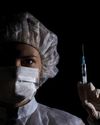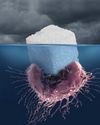
Psychological stress has long been linked to cancer. More than 2,000 years ago, Galen, a Greek physician, noted that depressed people were more prone to developing the disease. In 1759, an English surgeon wrote that cancer went along with "disasters in life, as occasion much trouble or grief."
A German physician named Dr Ryke Geerd Hamer further proved the mind-body cancer connection. Shortly after his son Dirk's sudden and untimely death, Dr Hamer was diagnosed with testicular cancer. Since his son was in good health in general and had never been seriously ill, Dr Hamer began to wonder if the shocking loss of his son was somehow related to the development of his own cancer. This hypothesis was just the start of a fascinating scientific journey.
As Dr Hamer, then a head internist at a cancer clinic at the University of Munich, began delving into the history of his cancer patients, he discovered a vital correlation. They had all undergone some form of shocking trauma-which he called "conflict shocks"-prior to diagnosis. He hypothesized that since all bodily processes are controlled by the brain, these acute stressful incidents manifested as disease and malfunction of specific organs. After poring over thousands of patients' medical records and brain scans, Dr Hamer concluded that every single disease-not just cancer could be linked back to these conflict shocks.
A common theme
Dr Hamer's research makes perfect sense. In my clinical experience, I've found that stress from ongoing emotional conflicts-bad marriages, negative parent-child relationships or sibling disagreements-plays a crucial role in the development of every single one of my patients' illnesses. You read that correctly: unresolved conflicts from past or present relationships greatly affect our well-being. Repressing these long-held emotions has a tremendous negative impact and allows stress to brew in our bodies.
هذه القصة مأخوذة من طبعة April/May 2023 من What Doctors Don't Tell You Australia/NZ.
ابدأ النسخة التجريبية المجانية من Magzter GOLD لمدة 7 أيام للوصول إلى آلاف القصص المتميزة المنسقة وأكثر من 9,000 مجلة وصحيفة.
بالفعل مشترك ? تسجيل الدخول
هذه القصة مأخوذة من طبعة April/May 2023 من What Doctors Don't Tell You Australia/NZ.
ابدأ النسخة التجريبية المجانية من Magzter GOLD لمدة 7 أيام للوصول إلى آلاف القصص المتميزة المنسقة وأكثر من 9,000 مجلة وصحيفة.
بالفعل مشترك? تسجيل الدخول

Metalhead
Could toxic heavy metals be making you ill? Here's how to spot the signs and symptoms, says Dr Leigh Erin Connealy, and your action plan for effective detox

Good bones
There's a lot of fearmongering when it comes to the risk of fractures in older women, says Marcelle Pick. Here's what you need to know and how to look after your bones naturally

Supplements in the spotlight
Confused about supplements? Dr Jenny Goodman has the lowdown on why we need them, how to choose a top-quality product and the ingredients to avoid

Essentially balanced
These essential oils can help you soothe stress, balance your hormones and feel like your best self again

An integrative approach to breast cancer
Blending the best of integrative medicine with the best of conventional medicine gives the greatest chance of healing breast cancer, says Dr Leigh Erin Connealy

THE NEEDLE'S EDGE
An intriguing new theory says it's not what's in the jabs but how the needles are inserted that explains the rampant and varied Covid vaccine damage. Celeste McGovern investigates the Bolus Theory

How sugar causes cancer
Amajor breakthrough in cancer research has discovered that sugar-usually from fast food-switches off our cancer-fighting genes

The illusion of the magician
Howrelative risk makes a drug seem effective when it’s not

Of pesticides and PMS
Detoxing from a hormone-disrupting herbicide, along with getting the right nutrition, was the answer to a patient’s debilitating PMS, says Dr Jenny Goodman

Not just a phase
Is your workout working against your hormones? Debra Atkinson explains why and how to exercise with your hormonal cycle for the best results